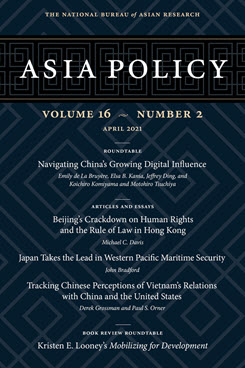China’s Growing Influence over the Rules of the Digital Road
This essay examines the growing role of China in international standards-setting organizations as a window into its efforts to influence global digital governance institutions and highlights areas where the U.S. can preserve its interests in cyberspace.
EXECUTIVE SUMMARY
MAIN ARGUMENT
In recent years China’s international influence in shaping the digital rules of the road has increased. Evidence of the country’s growing role in digital standards-setting organizations comes from increased numbers of submissions to key international technical standards bodies as well as enhanced Chinese representation in leadership positions in these bodies. This trend is evident in emerging technologies, such as artificial intelligence, which provide opportunities for China to lead in the formulation of new systems of standards. At the same time, it is important to avoid overstating the country’s role in global digital governance. China’s standards-setting influence is qualified by the caliber of its submissions and by comparison with other leading countries.
POLICY IMPLICATIONS
- The U.S. must recognize that China is becoming a more important player in setting international standards for digital technologies, and that this trend comes with both risks and benefits.
- To bolster U.S. industry participation in international standards-setting, the U.S. can provide more support for hosting international standards gatherings and for U.S. subject matter experts to participate in standards-setting forums.
- International standards-setting organizations can also take steps to check undue Chinese government influence, such as by strengthening anonymous voting procedures.
Jeffrey Ding is a PhD candidate in international relations at the University of Oxford (United Kingdom). He is currently a pre-doctoral fellow at Stanford’s Center for International Security and Cooperation, sponsored by Stanford’s Institute for Human-Centered Artificial Intelligence (United States). He is also a researcher at the Centre for the Governance of AI at the University of Oxford, where he focuses on China’s development of artificial intelligence.
About Asia Policy
Asia Policy is a peer-reviewed scholarly journal presenting policy-relevant academic research on the Asia-Pacific that draws clear and concise conclusions useful to today’s policymakers. Asia Policy is published quarterly in January, April, July, and October and accepts submissions on a rolling basis. Learn more


